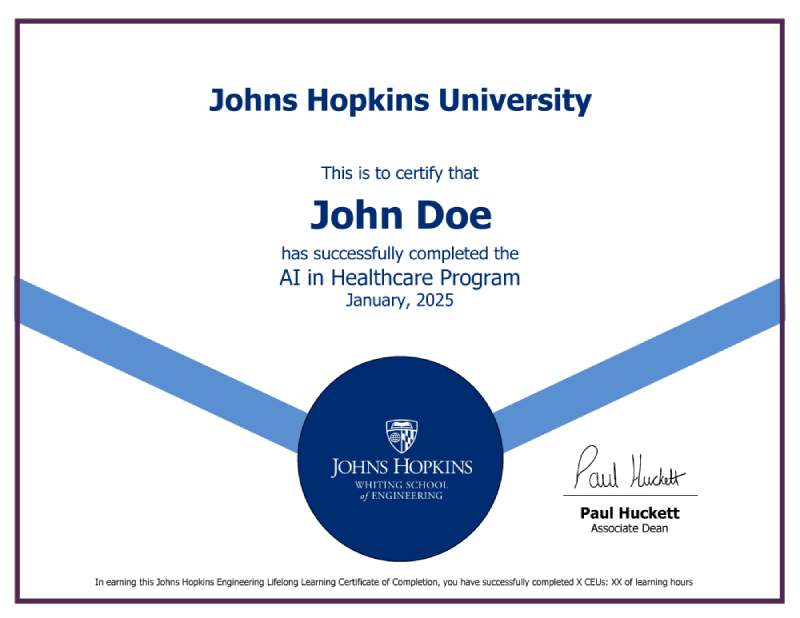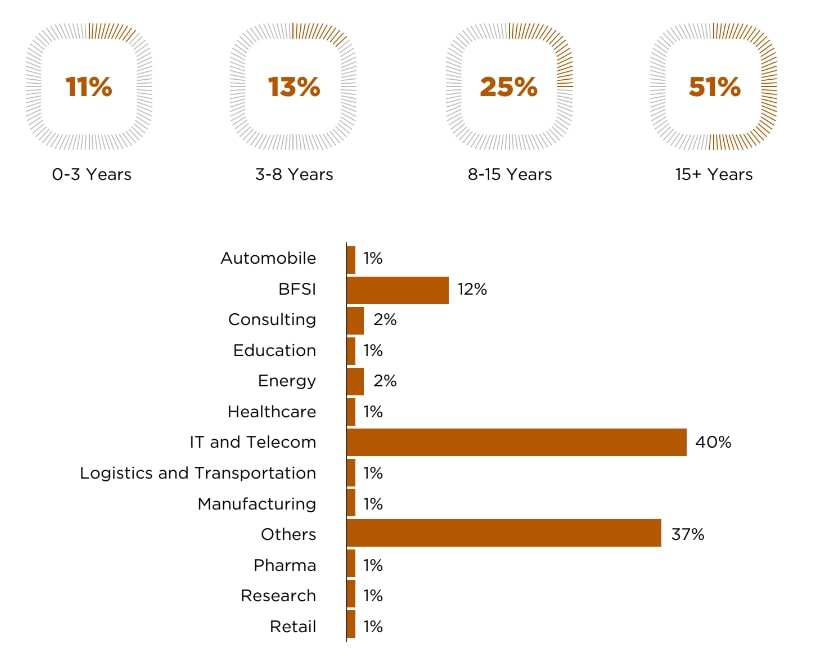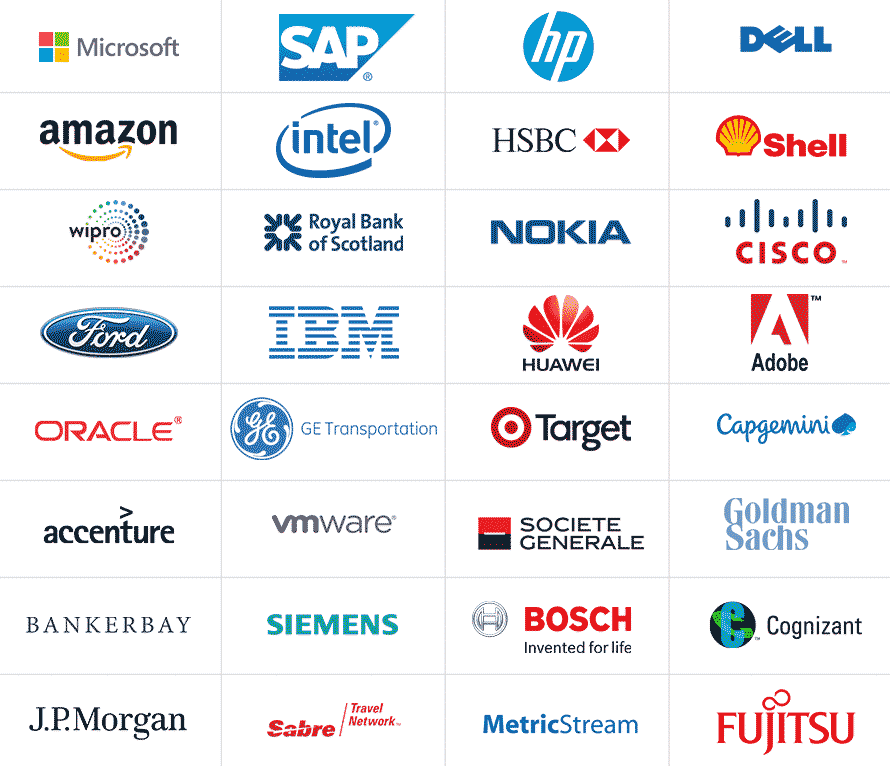Learn more about the course
Get details on syllabus, projects, tools, and more
Upskill Your Teams with Future-Ready Skills
Empower your workforce with programs from leading universities
-
Team Pricing
Maximize ROI with exclusive cost-effective plans for group enrollments
-
Team Learning Dashboard
Track progress & outcomes at the team level
-
Customized Learning Paths
Tailor the program to align with your team's goals and drive meaningful outcomes.
Enter your organisation name
This will help us customise the proposal plans

AI in Healthcare Program
Learn from World-Renowned JHU Faculty
Application closes 29th Jan 2026

Program Outcomes
Advance Healthcare with AI-Powered Solutions
Leverage AI to enhance patient care, optimize workflows, and drive better decision-making.
Earn a Certificate from Johns Hopkins University
Key program highlights
Why Choose the AI in Healthcare Program
-

Learn from a Top-Ranked University
Earn a certificate from the prestigious Johns Hopkins University, learning from world-class faculty and industry leaders.
-

Industry-Aligned Curriculum
Master AI-driven decision support, personalized medicine, and business strategies for AI implementation in healthcare.
-

Flexible Learning Format
Learn from recorded lectures, live mentored sessions, and AI-assisted learning tools.
-

8+ Real-World Case Studies
Work on 8+ practical case studies, applying AI to disease prediction, clinical workflows, and personalized patient care.
-

Get Expert Mentorship
Get insights from industry experts to refine your projects and advance your career in AI-driven healthcare.
-

Personalized Program Support
Receive 1:1 guidance from a dedicated Program Manager and academic support from AI experts.
Skills you will learn
Applying AI Solutions in Healthcare
Predictive Analytics for Disease Management
Ethical AI Practices and Regulatory Compliance
AI-Driven Decision Support Systems
AI Project Management for Healthcare Initiatives
Large Language Models (LLMs) in Healthcare
Strategic AI Integration in Healthcare Systems
Machine Learning Algorithms for Clinical Applications
Robotic Process Automation in Clinical Settings
Change Management for AI Adoption in Hospitals
Applying AI Solutions in Healthcare
Predictive Analytics for Disease Management
Ethical AI Practices and Regulatory Compliance
AI-Driven Decision Support Systems
AI Project Management for Healthcare Initiatives
Large Language Models (LLMs) in Healthcare
Strategic AI Integration in Healthcare Systems
Machine Learning Algorithms for Clinical Applications
Robotic Process Automation in Clinical Settings
Change Management for AI Adoption in Hospitals
view more
- Overview
- Curriculum
- Projects
- Certificate
- Faculty
- Mentors
- Fees
- FAQ

This Program is Ideal for Professionals Seeking to Harness AI in Healthcare
Empower yourself with AI-driven skills to transform healthcare strategies and public health.
-
Technical Professionals and Healthcare Consultants
Master AI techniques to analyze healthcare data, automate routine tasks, and enhance clinical decision-making.
-
Business and Strategy Leaders in Healthcare and HealthTech
Lead AI-driven healthcare initiatives, optimize operational efficiency, and drive strategic business outcomes.
-
Medical, Pharmaceutical and Biotech Professionals
Apply AI to enhance diagnostics, personalize treatment plans, and accelerate medical research.
-
Regulators and Healthcare Policymakers
Leverage AI for policy analysis, data-driven decision-making, and effective resource allocation in public health.
Curriculum of AI in Healthcare Program
The AI in Healthcare curriculum is thoughtfully designed by renowned faculty at Johns Hopkins University with real-world application. This no-code program covers foundational AI concepts, clinical decision support, health and disease management, and business strategy for healthcare, with 2 masterclasses on project management and future trends taught by JHU faculty.
Pre-Work: Introduction to the World of AI in Healthcare
Gain foundational knowledge on AI's evolution in healthcare, including key milestones, ethical considerations, and real-world impact.
Module 1: Foundations of AI for Healthcare
In this module, you will learn the fundamentals of Artificial Intelligence (AI) and its core technologies, focusing on their application in healthcare. You will explore the R.O.A.D. Management Framework for AI integration, define algorithms, and differentiate key machine learning models. Additionally, you will evaluate model performance using metrics like accuracy and F1 score, and assess the difference between pseudo-innovation and real innovation in healthcare.
Week 1: AI in Healthcare: Foundations and Frameworks
In the first week, you will explore the core technologies and terminology of Artificial Intelligence (AI) and its role in healthcare delivery. This week, you will learn the definition of AI, key AI technologies, essential terminology, and how AI impacts health outcomes. You will also learn about the importance of randomization in AI applications and the reliability and validity of AI interventions. Additionally, the R.O.A.D. Management Framework will be introduced as a strategic tool to guide the effective integration of AI into healthcare systems, ensuring alignment with organizational goals and optimizing AI-driven outcomes.
Case Study: Claims automation and boosting hypertension classifier performance
Week 2: Understanding the Building Blocks of AI in Healthcare
This week, you will get an overview of six machine learning algorithms, highlighting their primary use cases and principles. Algorithms are defined as step-by-step problem-solving procedures and you will understand their fundamental components, including how they function in various problem-solving scenarios. You will learn to assess machine learning models using key metrics and evaluate their effectiveness. Additionally, the module explores the differences between pseudo-innovation and real innovation in healthcare, highlighting the importance of evidence-based evaluation to distinguish genuine advancements from mere trends.
Module 2: AI for Intelligent Decision Support
This week, you will explore how AI has the potential to enhance decision-making in healthcare by leveraging predictive modeling, neural networks, and deep learning. You will analyze the concept of human baseline in AI, risk-based approaches, and psychological factors, including prospect theory and status quo bias. The module also covers AI's role in managing information overload, the potential of Large Language Models (LLMs) in improving healthcare workflows, and the challenges associated with AI biases and human oversight.
Week 3: AI for Clinical Decision Support
This week, you will explore the concept of the human baseline in AI, comparing it to risk-based approaches while considering manual processes and the effects of prospect theory and status quo bias. You will evaluate the role of predictive modeling, neural networks, and deep learning in healthcare and examine how these techniques can be applied to address healthcare challenges. You will evaluate predictive techniques for hospital complications, analyze the effectiveness of these techniques in real-world applications, and explore data-driven approaches for assessing risk factors and outcomes.
Case Study: Correcting Optimism Bias in Organ Donation
Week 4: Large Language Model Fundamentals and Clinical Considerations
This week, you will analyze AI's role in managing information overload in medical literature and explore strategies for effective data synthesis to support healthcare decision-making. You will then examine the role of Large Language Models (LLMs) in healthcare, particularly their ability to automate administrative tasks and facilitate patient interactions, ultimately reducing clinician burnout by streamlining workflows. You will further evaluate the limitations of LLMs, identifying areas where these models currently lack reliability and require improvements. You will discuss the challenges to the widespread adoption of LLMs in healthcare and the crucial need for human oversight in their applications.
Week 5: Automation/Robotics for Healthcare
This week, you will gain a comprehensive understanding of how robotic-assisted surgery enhances precision and outcomes in surgical procedures, contributing to improved recovery times and reduced complications. You will explore the benefits and risks of robotic surgery while also examining the current technologies driving advancements in this field. Learners will delve into future trends and innovations, highlighting the ongoing evolution of robotic surgery. Additionally, the concept of robotic process automation (RPA) will be introduced, with a focus on its applications in healthcare. You will further explore how automation streamlines repetitive tasks across industries, improving efficiency, reducing errors, and enhancing productivity in clinical settings. The benefits of integrating automation into healthcare operations will also be discussed, demonstrating its potential to transform healthcare delivery.
Case Study: Claims automation and boosting hypertension classifier performance
Module 3: AI for Public Health and Personalized Medicine
Upon completing this module, you will be able to analyze graph analytics related to co-morbidity, identifying risk factors and social influences on health interactions to improve patient management. You will explore the cultural impacts on medication adherence and their implications for public health interventions. Further, in the module, you will apply epidemiological models, such as Markov models and the S-E-I-R framework, to assess disease spread and the effectiveness of AI tools during pandemics. Additionally, you will examine AI's role in precision medicine to enhance health screening, treatment protocols, and early disease detection, optimizing preventive healthcare strategies, and improving patient outcomes.
Week 6: AI for Improved Health Outcomes
In this week, you will analyze co-morbidity data to identify key risk factors and assess how social and cultural influences impact health interactions and medication adherence. You will explore graph analytics and epidemiological models, such as Markov and S-E-I-R, to understand disease spread and its impact on public health. The week will also cover the role of AI in enhancing health outcomes, especially in the context of pandemics, where AI tools can be used to improve response strategies. Learners will gain insights into how AI-driven approaches can identify risk factors, inform public health interventions, and support disease spread analysis to manage health crises better.
Case Study: COVID-19 with Bayesian data augmentation
Week 7: Learning Break
Week 8: Designing Preventive Healthcare Strategies
In this week, you will analyze AI's role in precision medicine, focusing on how it has the potential to enhance health screening processes and personalized treatment protocols to improve patient outcomes. You will explore predictive models in healthcare, learning how these models aid in early disease identification, leading to more effective preventive healthcare strategies. By assessing how AI can contribute to disease burden reduction and optimize treatment paths, you will understand how AI can drive improvements in both individual patient care and broader healthcare practices.
Case Study: Predicting auto-immune diseases
Module 4: AI Business Strategy for Healthcare
Upon completion of this module, you will understand the R.O.A.D. Management Framework for AI integration in healthcare and identify common pitfalls in AI projects, proposing risk mitigation strategies. You will analyze ethical, regulatory, and privacy challenges, along with best practices for managing datasets in Electronic Health Records (EHRs). You will assess healthcare leadership styles and their impact on AI adoption, explore social network strategies for organizational change, and evaluate methods for scaling AI pilot projects to full hospital implementation. Lastly, you will investigate career paths in AI within healthcare, identify essential skills, and understand AI's role in optimizing pharmaceuticals and medical devices to enhance efficacy and patient safety.
Week 9: Health Data & Ethics
This week, you will analyze the ethical, regulatory, and privacy challenges of AI in healthcare, focusing on strategies to promote fairness and ensure equitable access while safeguarding patient data. The discussion will cover ethical considerations, regulatory frameworks for AI technologies, and privacy concerns related to AI solutions. Learners will explore methods for protecting patient data, processes for exporting Electronic Health Records (EHRs), and best practices for data cleaning and management. Additionally, you will examine strategies for integrating AI models into EHR systems, ensuring compliance with industry standards and ethical guidelines.
Case Study: Series of cases in bias, randomization, human baseline, race unaware
Week 10: Change Management & Adoption
This week, you will examine formal and informal leadership styles in healthcare, assessing their impact on team dynamics, decision-making, and AI implementation. You will analyze how social network-based change management influences AI adoption and explore the role of interpersonal connections in driving organizational change. The sessions this week also cover strategies for scaling AI pilot projects across health systems, addressing challenges in hospital-wide AI implementation, and identifying best practices for sustainable AI adoption in healthcare.
Case Study: Informal leadership in healthcare and social networks
Masterclass 1: AI Project Management & Design
This Masterclass focuses on the R.O.A.D. Management Framework for integrating AI in healthcare and exploring key components essential for successful implementation. The session covers strategic AI integration, common pitfalls in AI projects, and the impact of data issues on AI success. Learners will examine the role of stakeholder engagement, the influence of change management, and factors that contribute to successful AI project outcomes. Additionally, the masterclass will provide mitigation strategies to address risks and challenges, increasing the probability of the effective deployment of AI-driven solutions in healthcare.
Masterclass 2: Future Trends in AI & Healthcare
This masterclass will help you explore career paths in AI within the healthcare sector by developing the skills and competencies required for success. The session will cover strategies for personal career advancement and the growing role of AI in pharmaceuticals and medical devices. Learners will assess how AI has the potential to enhance efficacy, reduce time-to-market for new treatments, and improve patient safety. Additionally, the masterclass will teach the specific skills to determine whether AI-driven solutions truly optimize medical devices and provide greater precision and reliability in healthcare applications.
Work on 8+ practical healthcare case studies
Engage in real-world healthcare case studies on how AI can improve patient outcomes and hospital efficiency
Earn a Professional Certificate from Johns Hopkins University
Get a Certificate of Completion from Johns Hopkins University (With 6 Continuing Education Units - CEUs)
-

Tech Leadership
#1 Computer Information Technology by U.S. News & World Report
-

National Recognition
#6 National University by U.S. News & World Report
-

Global Standing
#13 Best Global University by U.S. News & World Report

* Image for illustration only. Certificate subject to change.
Meet Your Faculty
Learn from World-Renowned JHU Faculty
Interact With Our Mentors
Engage with leading AI experts who will guide you in applying AI to improve patient outcomes and advance your career in healthcare.
Program Fee
The course fee is USD 2,990
Lead AI Innovation in Healthcare:
-

Demonstrate AI’s role in disease prediction, risk stratification, and decision support.
-

Learn to integrate AI tools with existing clinical systems.
-

Work on case studies that explore AI-driven automation and predictive analytics.
-

Learn from renowned faculty and industry leaders shaping AI in healthcare
-
INSTALLMENT PLANS
Upto 12 months Installment plans
Explore our flexible payment plans
View Plans
-
discount available
USD 2,990 USD 2,650
USD 2,990 USD 2,840
Third Party Credit Facilitators
Check out different payment options with third party credit facility providers
*Subject to third party credit facility provider approval based on applicable regions & eligibility
Admission Process
Admissions close once the required number of participants enroll. Apply early to secure your spot
-

1. APPLY
Fill out an online application form.
-

2. REVIEW
Your application will be reviewed by a panel from Great Learning to determine if it is a fit with the program
-

3. JOIN PROGRAM
After a final review, you will receive an offer for a seat in the upcoming cohort of the program.
Batch start date
-
Online · 14th Feb 2026
Admission closing soon
Frequently asked questions
What is the AI in Healthcare course offered by Johns Hopkins University?
The 10-week online program focuses on 3 key areas:
Intelligent Decision Support: Application of AI in predicting disease likelihood, identification and mitigation of biases in clinical datasets, and considering Large Language Models (LLMs) for medical assistance.
AI for Personalized Medicine: Usage of AI to design preventive healthcare strategies that improve health outcomes and deliver personalized care solutions.
AI Business Strategy for Scaling Solutions: Creating strategic integration of AI in healthcare business models that involves AI to drive efficiency, scalability, and sustainability in healthcare delivery.
What are the key outcomes of this program?
By the end of the program, you will be able to:
AI Fundamentals and Integration: Gain insights into AI technologies and the R.O.A.D. Management for healthcare integration.
- Machine Learning Models: Understand key algorithms and evaluate their performance using metrics like Accuracy and F1 score.
- Human Baseline and Ethics: Analyze the complex nuances of psychological predators, ethical challenges, and regulatory considerations for AI in healthcare.
- Predictive Analytics: Understand the role of AI in forecasting healthcare complications, managing information overload, and evaluating the applications of LLMs in healthcare.
- Graph Analytics: Explore comorbidity, health risks, social influences, and cultural factors affecting medication adherence.
- Epidemiological Models: Apply frameworks like Markov models and SEIR to assess disease spread and explore AI tools for improving health outcomes during pandemics.
- AI Project pitfalls: Identify risks in AI projects and propose mitigation strategies for effective dataset management in Electronic Health Records (EHRs).
- Healthcare Leadership: Assess leadership styles and explore social network strategies for driving AI adoption in organizations.
- Scaling AI projects: evaluate methods for scaling AI pilots to full hospital implementation with sustainable best practices.
- Career Paths in AI: Investigate essential skills and the role of AI in optimizing pharmaceuticals and medical devices for better outcomes.
What is the duration of this AI and Machine Learning in healthcare program?
The duration of this AI in Healthcare program is 10 weeks.
What is the structure and format of the AI in Healthcare Program?
The program is offered in a flexible online format that includes
- Recorded video lectures,
- Live interactive sessions with global industry experts
- Two live masterclasses conducted by JHU faculty
What topics are covered in the curriculum of this artificial intelligence course for healthcare professionals?
The topics in the curriculum of this AI in healthcare program include:
- Introduction to the World of AI In Healthcare
- Foundations of AI for Healthcare
- AI for Intelligent Decision Support
- AI for Public Health and Personalized Medicine
- AI Business Strategy for Healthcare
- AI Project Management and Design
- Future Trends in AI and Healthcare
Is there any learning support that I would receive in this healthcare artificial intelligence course?
Yes, the program offers comprehensive learning support, including:
- Personalized assistance from a Dedicated Program Manager to stay on track and manage your learning journey effectively.
- Mentorship from global industry experts who will guide you through real-world applications and project work.
What is the weekly commitment that I have to make with this program?
The weekly commitment will be 6-8 hours per week.
Who will be the faculty teaching me this course?
- Dr. Ian McCulloh: Faculty Leader in AI and Strategy, Johns Hopkins University
- Daniel Byrne: Award-Winning Author, Teacher, and Faculty Member, Johns Hopkins University
What are the masterclasses in this program about?
The course includes two masterclasses led by Johns Hopkins University faculty, focusing on:
- AI Project Management and Design
- Future Trends in AI and Healthcare
Will I earn a certificate from Johns Hopkins University if I complete this AI in Healthcare Program?
Yes, upon successful completion of the program, you will receive a Certificate of Completion from Johns Hopkins University.
What are the rankings of JHU?
According to the U.S. News & World Report rankings, JHU is:
- #6 among National Universities (2025)
- #1 Biomedical Engineering Program (2025)
- #13 among Best Global Universities (2024)
What is the role of Great Learning in this program?
The AI in Healthcare program by Johns Hopkins University is delivered in collaboration with Great Learning, providing an innovative and engaging learning experience. Great Learning manages the enrollments and provides industry experts, student counselors, course support, and guidance to ensure students get hands-on training and live personalized mentorship on the application of concepts taught by the JHU faculty.
Who is this program ideal for?
This program is ideal for healthcare professionals who want to leverage Artificial Intelligence to address challenges and enhance decision-making in the healthcare domain. It is particularly suited for:
- Medical, Pharmaceutical, and Biotech Professionals or Researchers
- Business and Strategy Leaders in Healthcare and HealthTech
- Technical Professionals or Healthcare Consultants
- Regulators or Healthcare Policymakers
What is the admission process for the AI in healthcare program?
The admissions for the program close once the required number of participants enroll. Apply early to secure your spot. Here are the steps for admissions:
1. APPLY
Fill out an online application form.
2. REVIEW
Your application will be reviewed by a panel from Great Learning to determine if it fits the program.
3. JOIN PROGRAM
After a final review, you will receive an offer for a seat in the upcoming cohort of the program.
What is the total fee for the program?
The Fee for AI in Healthcare Program is 2,990 USD
Are payment plans or financing options available?
Yes, flexible EMI options and financial assistance may be available to eligible candidates. Please check with the admissions team during your application process.
Does the fee include certification and all learning materials?
Yes, the program fee includes access to all course materials, live masterclasses, mentorship, and a professional certificate from Johns Hopkins University.
How can Generative AI be used in healthcare?
Generative AI for healthcare is increasingly being applied to:
- Automate clinical documentation
- Enhance medical imaging
- Support drug discovery
- Personalize treatment plans
- Power intelligent chatbots for patient interaction
Where can I contact for more queries?
You can contact us at
office-aihc-gl@jhu.edu
or +1 410 936 4682.
Delivered in Collaboration with:
Johns Hopkins University is collaborating with online education provider Great Learning to offer the AI in Healthcare Program. Great Learning is a professional learning company with a global footprint in 14+ countries. Its mission is to make professionals around the globe proficient and future-ready. This program leverages JHU's leadership in innovation, science, engineering, and technical disciplines developed over years of research, teaching, and practice. Great Learning manages the enrollments and provides industry experts, student counselors, course support and guidance to ensure students get hands-on training and live personalized mentorship on the application of concepts taught by the JHU faculty.
Batch Profile
The PGP-Artificial Intelligence and Machine Learning class represents a diverse mix of work experience, industries, and geographies - guaranteeing a truly global and eclectic learning experience.

The PGP-Artificial Intelligence and Machine Learning class comes from some of the leading organizations.




 Speak with our expert
Speak with our expert




























